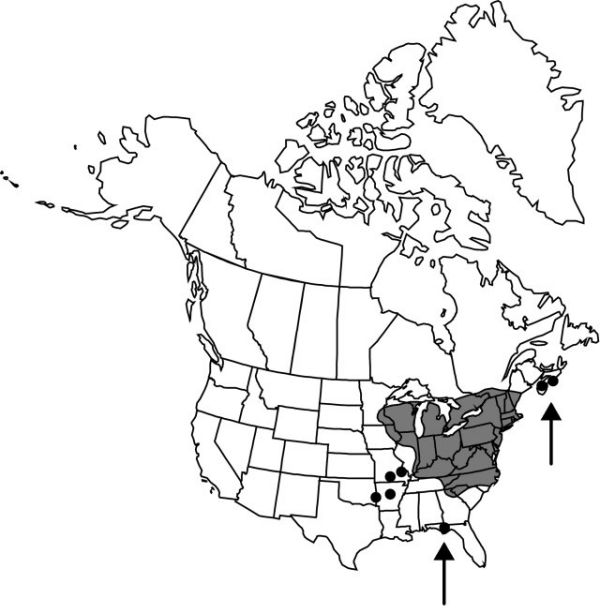Difference between revisions of "Goodyera pubescens"
in W. Aiton and W. T. Aiton, Hortus Kew. 5: 198. 1813.
FNA>Volume Importer |
FNA>Volume Importer |
||
| Line 11: | Line 11: | ||
|name=Neottia pubescens | |name=Neottia pubescens | ||
|authority=Willdenow | |authority=Willdenow | ||
| + | |rank=species | ||
|publication_title=Sp. Pl. | |publication_title=Sp. Pl. | ||
|publication_place=4(1): 76. 1805 | |publication_place=4(1): 76. 1805 | ||
| Line 17: | Line 18: | ||
|name=Peramium pubescens | |name=Peramium pubescens | ||
|authority=(Willdenow) MacMillan | |authority=(Willdenow) MacMillan | ||
| + | |rank=species | ||
}} | }} | ||
|hierarchy=Orchidaceae;Orchidaceae subfam. Orchidoideae;Orchidaceae tribe Cranichideae;Orchidaceae (tribe Cranichideae) subtribe Goodyerinae;Goodyera;Goodyera pubescens | |hierarchy=Orchidaceae;Orchidaceae subfam. Orchidoideae;Orchidaceae tribe Cranichideae;Orchidaceae (tribe Cranichideae) subtribe Goodyerinae;Goodyera;Goodyera pubescens | ||
| Line 41: | Line 43: | ||
-->{{#Taxon: | -->{{#Taxon: | ||
name=Goodyera pubescens | name=Goodyera pubescens | ||
| − | |||
|authority=(Willdenow) R. Brown | |authority=(Willdenow) R. Brown | ||
|rank=species | |rank=species | ||
| Line 56: | Line 57: | ||
|publication year=1813 | |publication year=1813 | ||
|special status= | |special status= | ||
| − | |source xml=https://jpend@bitbucket.org/aafc-mbb/fna-data-curation.git/src/ | + | |source xml=https://jpend@bitbucket.org/aafc-mbb/fna-data-curation.git/src/f50eec43f223ca0e34566be0b046453a0960e173/coarse_grained_fna_xml/V26/V26_1049.xml |
|subfamily=Orchidaceae subfam. Orchidoideae | |subfamily=Orchidaceae subfam. Orchidoideae | ||
|tribe=Orchidaceae tribe Cranichideae | |tribe=Orchidaceae tribe Cranichideae | ||
Revision as of 20:44, 16 December 2019
Leaves: blade distinctly lined with white or greenish white on veins throughout, broadly elliptic to broadly ovate, 2.1–6.2 × 1.3–3 cm, apex acute or obtuse. Inflorescences 10–57-flowered, cylindric (equally dense on all sides); peduncle 11–35 cm. Flowers: lateral sepals 3.1–5.3 mm; petals distinct; hood 3.6–5.7 mm; lip scrotiform, 2.5–4.2 × 2.2–3.5 mm, apex reflexed, outer surface slightly tuberculate, inner surface with somewhat thickened veins, without glandular processes; anther inflexed, immersed in cup-shaped clinandrium, apex blunt; pollinia blunt; rostellum with marginal notch 0.1–0.4 mm deep; viscidium orbiculate. 2n = 26.
Phenology: Flowering mid Jul–early Sep.
Habitat: Almost any wooded habitat with acid surface conditions, most frequent on moist humus soils in shady, upland woods of hemlock, pine, oak, or maple, less frequent in lowland woods, bogs, swamps
Elevation: 0–1600 m
Distribution

N.S., Ont., Que., Ala., Ark., Conn., Del., D.C., Fla., Ga., Ill., Ind., Iowa, Ky., Maine, Md., Mass., Mich., Minn., Mo., N.H., N.J., N.Y., N.C., Ohio, Okla., Pa., R.I., S.C., Tenn., Vt., Va., W.Va., Wis.
Discussion
Goodyera pubescens is very different in its lip and column morphology, phenolic constituents, and chromosome number (2n = 26) from other North American Goodyera species, indicating that it is not closely related to them.
Selected References
None.